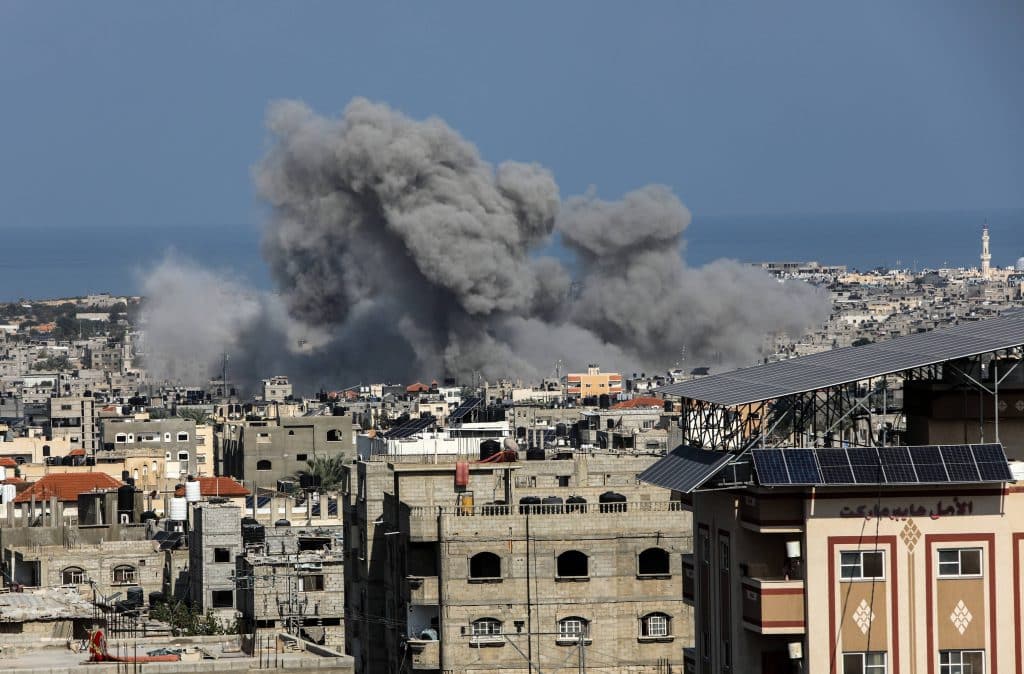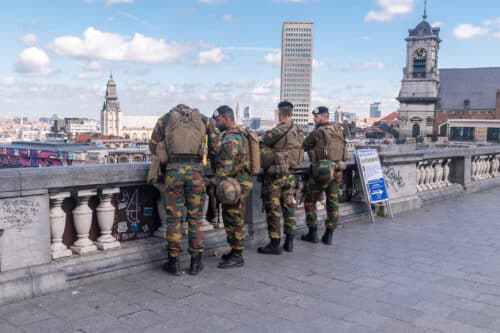
As our soldiers are fighting in Gaza and girding up on the Lebanon border, we as leading voices in the Israeli security milieu and reserve officers bear a special responsibility. Our utmost duty, above correctly reading the map and diagnosing the trends around us, is to acknowledge how the system was underprepared for October 7, and how achieving total victory in Gaza will best serve Israel’s security interests not just in the Gaza Strip, but vis-à-vis Lebanon and the region. Describing “total victory” as an empty slogan could not be further from the truth. Therefore, the worse thing we could possibly do is to politicize what the vast majority of Israelis view as absolutely indispensable.
Some voices in that milieu, including that of Major General Giora Eiland whom I greatly respect, call Israel to give up on such nonsensical notions such as finishing the job in the Gaza Strip, by not taking over Rafah and the Philadelphi Route. By so doing, they say, Israel will not only finish the war in Gaza as quickly as possible, but also avoid an unnecessary war in Lebanon. How can they tell? Well, based on statements by world leaders, and Hassan Nasrallah.
One of the most important lessons we learned after October 7, which I also described a year ago in my book “Heros of Our Own Story” (“We Will Not Go Back” in Hebrew) was that Israel must never deposit its security in the hands of others. Nor should it ever submit to irrelevant pressure by elements who only aspire to promote their own interests on the expense of Israel’s vital security needs.
As the IDF progresses in Khan Younis and braces for a critical phase in the war, the battle for Rafah, Eiland and others call to essentially give up, go back to pre-October 7, and dance to the tune of international trends, war fatigue, and continuously failing strategy of appeasement. Yet this is precisely what would lead us to ensure the next October 7 and have IDF soldiers’ blood spilled in vain. Israel knows how to push back on that pressure, and it should not guide keeping Israel’s vital security needs.
Yet even when by examining President Biden’s statements, it is clear to him too that it is indispensable to finish the job. The US shifted from officially warning Israel against an operation in Rafah to simply stress how “a military operation should not proceed without a credible and executable plan for ensuring the safety of and support for the civilians in Rafah”. That is basically the Israeli position. The IDF already offered plans to construct vast “tent cities” north to Rafah to ensure a safe passage and refuge place for civilians.
Yet the other part of that logic makes even less sense. Judging by statements made by the arch-terrorist Hezbollah’s Secretary General Hassan Nasrallah, it is tempting to believe that all Israel needs to do in order to avoid war with Lebanon is to retreat in Gaza, and let Hamas off the hook. In his speeches, Nasrallah threatens that the war in the north “will not stop until Israeli aggression in Gaza stops.”
Yet why should Israel submit to menacing statements by Nasrallah, and why should we believe him? An oversimplified calculation that Nasrallah’s terms are clear, and so that makes the path to calm clear, is simply non-sensical. Nasrallah’s whole philosophy is based on the armed struggle. Without it, Lebanese would notice more boldly his organization’s destruction of what used to be the Middle East’s cedar heaven. Hezbollah would lose its reason to exist.
We also know it’s false because we can examine the pre-October 7 situation in the north. In our IDSF Research Department’s study, “Hezbollah: On the Brink of Eruption?” dated August 2023, we elaborate on hundreds of incidents along the Lebanon border just since early 2023, including tearing off security cameras, confronting soldiers, shooting attacks, the launching of 34 rockets in Passover, the Megido suicide attack, and constructing tents in Israeli territory. Should Israel go back to those level of conflict with Hezbollah?
This precise attitude of defeatism led Israeli leaders to conclude the disastrous Gas Accord with Lebanon in October 2022, which we analyzed in detail. Against any common sense, Nasrallah’s “clear terms”, then and now, led Israel to surrender a maritime territory larger than the Tel Aviv district simply to avoid war and “buy silence” for the following months. What we got is an unmatched domestic achievement for Nasrallah in Lebanon, and the very opposite of silence. Those same security voices cheered on that step, inverse to what my colleagues and I viewed as quintessential to Israel’s security: a clear message that nobody should test our resilience to fight.
Surrendering to the terms of Hamas and Nasrallah in Gaza by retreating will serve our enemies well, and push the notion of peace with Saudi Arabia further than ever before. Our enemies understand assertiveness, not defeatism. Israel must finish the job in Gaza by annihilating all of Hamas’ remaining brigades, then ensure the IDF’s eternal freedom of operation in the Gaza Strip. No one will do that for us.
The objective of total victory in Gaza does not belong to any government or party; we hear it from combatants, commanders, evacuees, families of victims and hostages. And we know how vital it is given the humiliating failure of the Israeli containment strategy for decades around our borders. Now as our soldiers show immense bravery in the battlefield, they show the opposite of that defeatist attitude that calls to trust Israel’s security in the hands of others. Our security can only be trusted in our own hands.
This article was originally published in ynet news.






